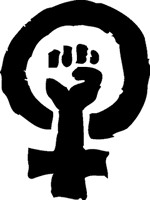
Can't Live with them, so We'll live Without them!: Women Only Worlds in Science Fiction
| Works of Literature | Authors | Motivation | Resources | Home |
|---|
"When it Changed"

"When it Changed," a short story by Joanna Russ (1972) features a planet inhabited by only women. On this planet,Whileaway, the women have adapted to their unique situation and enjoy living without men. They have learned how to create children by combining ova, and they participate in same sex marriages.
The story follows the narrator, Janet, and her wife Katy. Janet and Katy have three children together through combination of ova and are emotionally very close. Both are stunned and dismayed when male astronauts land on the planet.
The men talk to Katy and Janet about the return of men and what it means. When they originally learn about the absence of men on the planet, the men assume a rescue mode. Instead of asking how the women feel about the return of men, they assure the women that their "ordeal" of living without men is over. They are bewildered when the women don't react the way they expected. They have difficulty believing that the women are happy on a single gender planet.
While the men are talking to Katy and Janet, they have difficulty understanding the lack of gender roles. Although they do not ever ask which partner is the man in the relationship, Janet senses their curiosity. They attempt to assign gender roles to Katy and Janet when they interact with the women. They seem to decide that Katy is the woman in the relationship because they find her attractive. They hint to her that her life will improve when men come to the planet because she will be able to find a satisfactory (male) mate.

The women are deeply disturbed about the developments. They resent the intrusion of the men and fear that they will be relegated to second class citizens when the men return.
Analysis
The title "When It Changed," could refer to a variety of changes. I believe the title refers to the return of men to Whileaway, but my sources offered other possible explanations. The title could refer to the original change on the planet, the death of all the men, or it could mean the shift back to masculine language (mankind, his) from feminine language. For six hundred years, "woman" was a substitute for "person," and "her" was the automatic choice for a singular pronoun. When men reentered the society, they would certainly reestablish the pronoun usage common on Earth that favored men.
The characters in the story are designed to challenge the reader's preconceived notions about gender. Russ does not reveal the narrator's gender until the story is well under way. The reader assumes that the narrator is a man because "he" described "his" wife and children. Only when Yuki, the narrator's daughter, began exclaiming over the return of Earth men do we learn that the narrator is a woman.
The relationship between the narrator, Janet, and her wife Katy further tested both the reader and the male astronauts. The male astronauts assumed that the marriage was purely a practical partnership for convenience. They did not believe that true love and attraction could exist between two women. Similarly, the idea of gay marriage and stable families with two female parents would have been quite revolutionary in 1972, when this story was originally published. The lack of traditional gender roles in the relationship was also disconcerting to outsiders. Both the male astronauts and the reader tended to try to identify the dominant "man" in the relationship. However, both women exhibited stereotypically masculine traits. They dressed for practicality, not glamour. Katy was a mechanic, and Janet fought duels with other women. They equally shared the reproductive responsibilities; both gave birth to their children. Janet expressed her frustration at their limited view of roles within relationships: "As if we would produce a carbon copy of their mistakes" (Russ 951). Katy and Janet transcended the stereotypical roles of "dominant" and "submissive" to achieve equality within their marriage.

Whileaway is an example of the utopian construct of lesbian separatism. Lesbian separatists who subscribe to this utopian perspective envision the creation of self-sufficient societies without men. They have no interest in asserting their political power within the male-dominated society; instead, they want to construct all-female civilizations based on traditional female principles like cooperation, mutual support, caring, and childrearing. Although the women of Whileaway did not originally intend to live without men, their society adapted to the death of the males until men were both unnecessary and unwelcome. The women of Whileaway exemplified the lesbian separatist ideal of biological and emotional independence from men. As lesbians, they were completely independent of men because their emotional and sexual needs were fulfilled by other women. As scientists, they were able to use the combination of ova to transcend the need for sperm from the male. As humans, they were loath to accept the disrespect and oppression of the male-dominated society. As Janet said, "I do not like to think of myself mocked, of Katy deferred to as if she were weak, of Yuki made to feel unimportant or silly, of my other children cheated of their full humanity or turned into strangers" (Russ 951).
The battle of the sexes has waged for centuries; men and women have been constantly fighting for dominance within the family, the workplace, and society. Regardless of the sacrifices women have made throughout the years as they have battled for equality, discrimination against women still exists. While most feminist theories focus on how women can seek equal rights in a man's world, Russ offers an alternative: eliminate the men and establish a women-oriented society without male interference. Men can only hope that the women of the world ignore her advice.

Last Update: 3 Dec. 2009